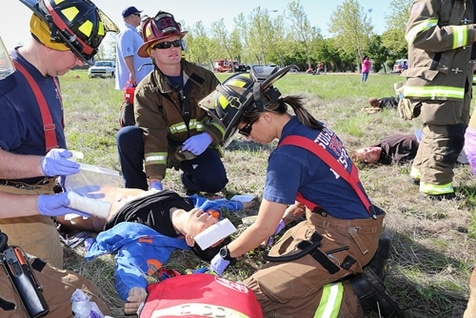Work Health and Safety (WHS) is not just a set of strict regulations; everyone in your workplace really can benefit from them.
Having all of the necessary equipment and supplies available onsite, from burn ointment to a defibrillator, is proven to save lives. But perhaps the key to the whole setup is the designated First-Aider.
First-Aiders are nothing new to most workplaces, but with the development of the Model WHS Act, the role of the First-Aider has become more significant. There is no extra daily work involved, but readiness and knowledge have both become essential traits for those designated in the role.
Who Should Be On Duty?
Under new WHS regulations, every workplace needs to have at least one fully-trained and certified First-Aider on hand during operating hours. He or she must be capable of dealing with a variety of possible events, from operating a defibrillator to tending to burns, to dealing with broken limbs.
Statistics published by Safe Work Australia show these are necessary for a First-Aider to be effective. Some 638,000 workers in Australia experienced at least one work-related injury over 12 months until June 2010.
The vast majority of the injuries could be initially treated at work before the worker is taken to hospital, such as:
- Sprains and strains (31% men, 29% women)
- Cuts and open wounds (19%, 12%)
- Fractures (8%, 7%)
- Burns (6%, 4%)
Training is Important
The importance of having a fully-trained member of staff on duty at all times cannot be underestimated. But knowing what the duties of the First-Aider actually are is also important, as well as how they should liaise with the resident PCBU.
Relevant information, taken from the official First-Aiders Fact Sheet [348KB] produced by Safe Work Australia, is posted below.
To learn more, simply visit the Safe Work Australia website.
Some Fact Sheet Facts
What Are My Duties as a First-Aider Under Model WHS Act?
If you are a worker who is a trained first aider, you do not have any additional duties beyond those of other workers. All workers have a duty to:
- Take reasonable care for their own health and safety;
- Take reasonable care not to adversely affect the health and safety of others;
- Comply with any reasonable instructions given by the PCBU to allow it to comply with its duties; and
- Co-operate with any reasonable policy or procedure relating to health and safety at the workplace.
This means that workers who are First-Aiders need to take ‘Reasonable Care’ for their own safety and that of others in performing their normal work and in their role as a First-Aider.
What is considered to be reasonable care will depend on what is reasonable in the circumstances taking into account your knowledge of first aid and the situation. In practical terms, the responsibility of First-Aiders is to provide care only to the level of their first aid training.
Will My Duties as a First-Aider Change Under the WHS Act?
The model WHS laws do not impose any new or additional duties on workers who are First-Aiders. If you are a trained first aider you will continue to have the same duties you have now.
Officers such as company directors have a duty to exercise due diligence to ensure that their PCBU complies with the model WHS Act. This duty extends to making sure that the PCBU has adequate arrangements in place for providing and accessing first aid equipment and resources.
First-Aiders who make decisions about first aid arrangements, procedures or how to administer first aid at the workplace, are not considered to be officers under the WHS Act.
Am I Entitled to be Paid For My Work as a First-Aider?
Under the model WHS Act, there is no requirement that a First-Aider be paid for performing that role. Some organisations and companies do pay their First-Aiders a nominal amount in recognition of the importance of the role they perform.
Further guidance is available in the Code of Practice: First Aid in the Workplace [1.3MB]
Alsco First Aid
Safety comes first! That’s what we need in our day to day activities. Understanding our customer’s needs identified a need not only for training courses but the ability to manage and maintain the total compliancy of certifications, and aspects of legislation over and above just training.
Alsco’s Managed Training Service is a complete solution that will compel action within your business. Our Training Guarantee ensures you manage your training costs irrespective of staff turnover.
It’s important that you respond promptly. Give Alsco a call for more details.
Image courtesy: Robert Couse-Baker


LEAVE A REPLY
Your email address will not be published. Required fields are marked *
You must be logged in to post a comment.